First thoughts on the new global alliance for climate-smart agriculture
October 7, 2014:
 |
 |
 |
The People's Climate March. Photograph by Takver |
One week on from the New York Climate Summit, which ARC was invited to attend for the launch of the new Global Alliance for Climate-Smart Agriculture of which we are a member, ARC’s Susie Weldon reflects on what has changed.
There were few government pledges of concrete action to tackle climate change. But last week’s New York Climate Summit, called by UN Secretary-General Ban Ki-moon to breathe new life into the stalled climate change negotiations, was significant for all that.
For a start, 120 government leaders made speeches committing themselves in public to stronger action on climate change. This is seen as an important step en route to the next international negotiations in Paris next year, when every country has to set new climate targets.
Second, it is clear that, unlike the last time national leaders gathered over climate change in Copenhagen in 2009, countries are feeling the effects of climate change. As Xie Zhenhua, vice-chairman of China's National Development and Reform Commission, told reporters that 'weather extremes have greatly affected the Chinese people'. This adds pressure on government leaders to make good their pledges of action.
Third, the People’s Climate March saw 300,000-400,000 people (including our friends at EcoSikh) process through New York demanding action from their governments. It was echoed by similar marches in cities around the world and many observers felt it marked a watershed in grassroots action on climate change.
 |
 |
 |
The People's Climate March. Photograph by South Bend Voice |
As Colombia University professor and Climate Marcher Todd Gitlin said, this was no simple spectacle for a day: “It represented the upwelling of something that matters so much more: a genuine global climate movement… There is today a climate movement as there was a civil rights movement and an antiwar movement and a women’s liberation movement and a gay rights movement.”
Fourth, bypassing governments, the summit produced a raft of commitments by businesses on climate change in various fields. For example, in a statement endorsed by Greenpeace, 24 major corporations committed to ending deforestation in their supply chains for palm oil by 2030 and to restoring a huge area of forest equivalent to the size of India. If this becomes reality, it will have massive benefits for the world’s rainforests.
Climate-Smart AgricultureOne of the key initiatives announced was the Global Alliance for Climate-Smart Agriculture. ARC is one of 100 organisations that have signed up to this major initiative aimed at promoting ways of helping us grow more food without trashing the Earth.
The Global Alliance has three aspirations:
Sustainable and equitable increases in agricultural productivity and incomes.
Greater resilience of food systems and farming livelihoods.
Reduction and/or removal of greenhouse gas emissions associated with agriculture (including the relationship between agriculture and ecosystems) wherever possible.
 |
 |
 |
Farming God's Way farmer, Simeon, with the field of cabbages he grew using techniques taught by Craig Sorley of Care of Creation Kenya |
The Global Alliance has been criticised by some civil society organisations and NGOs because it has not yet defined what it means by climate-smart agriculture or identified criteria for membership. They fear it may act as a cover for big business to promote agricultural practices that end up damaging ecosystems or smallholder farmers.
ARC shares these concerns. But after much thought, we decided to join the Alliance and push for these matters to be addressed from within. We have issued a statement on our reasons for joining. We are working with Christian and Muslim farmers in sub-Saharan Africa on faith-based approaches to conservation agriculture - a form of climate-smart agriculture.
Excitement and optimismThere was a real sense of excitement at the launch. Sharon Dijksma, Minister of Agriculture for Holland, which is one of the major supporters of the Alliance, said: 'The science is clear, the economics are compelling and now we have the political leadership to make it happen.'
Juergen Voegele, Senior Director of the World Bank’s Agriculture Global Practice, said he'd been part of the discussions five years ago when the idea for an alliance that focused on agriculture, climate change and increasing food production sustainably was first suggested.
'To me this is very exciting,' he said. 'I’ve been in development for 30 years and I’ve never experienced a trajectory from a big concept to become reality in just five years. This is why this thing works. It is not a trade-off – you can get higher productivity, better resilience and lower your footprint.
'We know NGOs have concerns. We believe we can prove them wrong - in a good way. The focus must be on the poor and vulnerable. They need increased resilience. Sixty per cent of our budget will go to support climate-smart agriculture.'
The government of Norway is another key supporter of the Alliance. The
The Global Alliance has issued an Action Statement on Agriculture signed by supporters.
Faiths for Green Africa Found out more about ARC's Faiths for Green Africa programme, working with Christian, Muslim and Hindu groups in 11 countries in sub-Saharan Africa on sustainable land and water management, including climate-smart agriculture.
Faith in Food
ARC's Faith in Food programme has produced an inspiring, colourful book, which has just been published by Bene Factum Publishing, looking at the food and farming issues through the lens of six of the world's major faiths. It is aimed at helping people consider how best they can honour their values in the food they eat, grow and buy.
Faith in Food: Changing the world one meal at a time been described as beautiful, amazing, engaging, powerful and poetic. Find out more about the book here.
|

